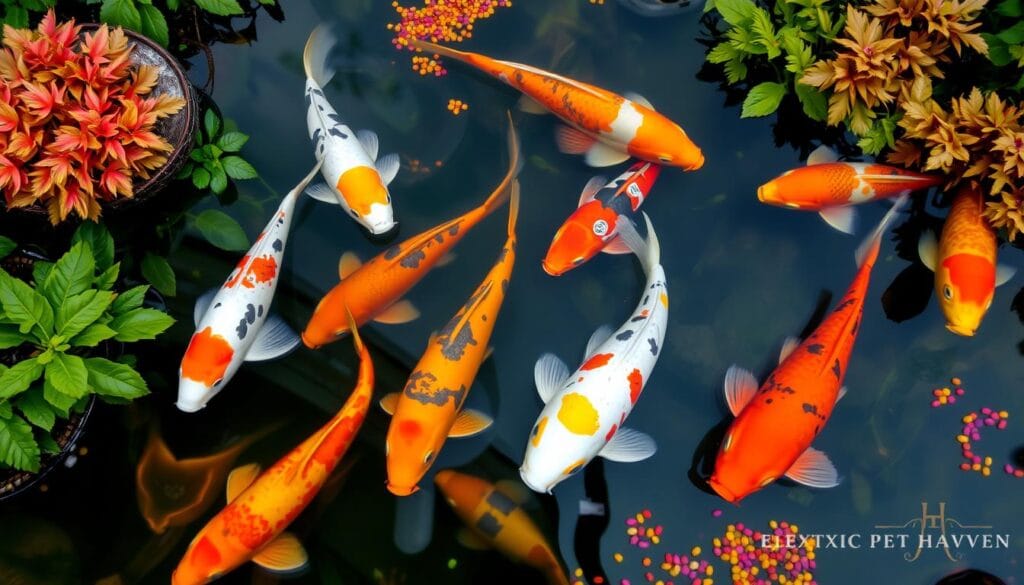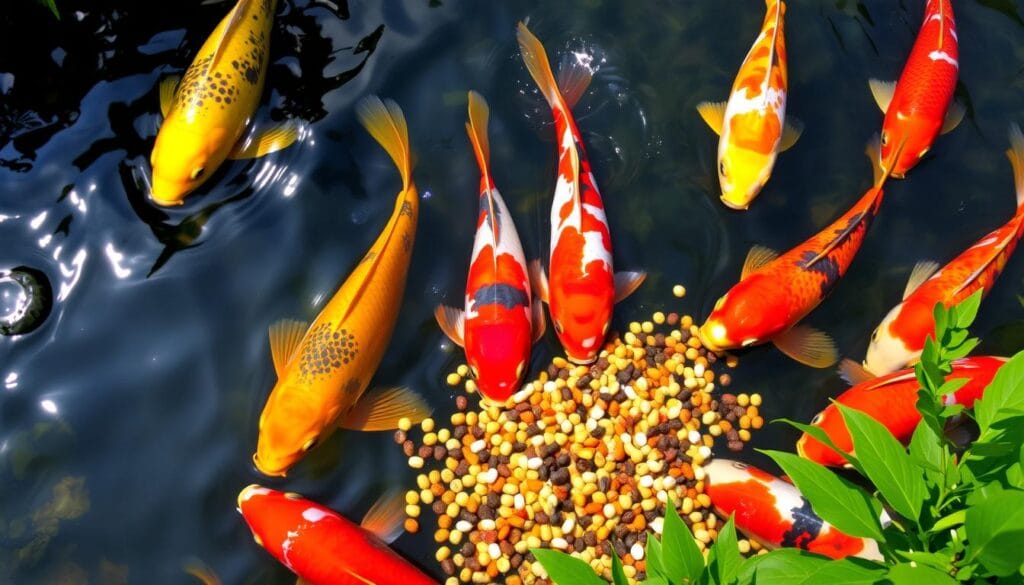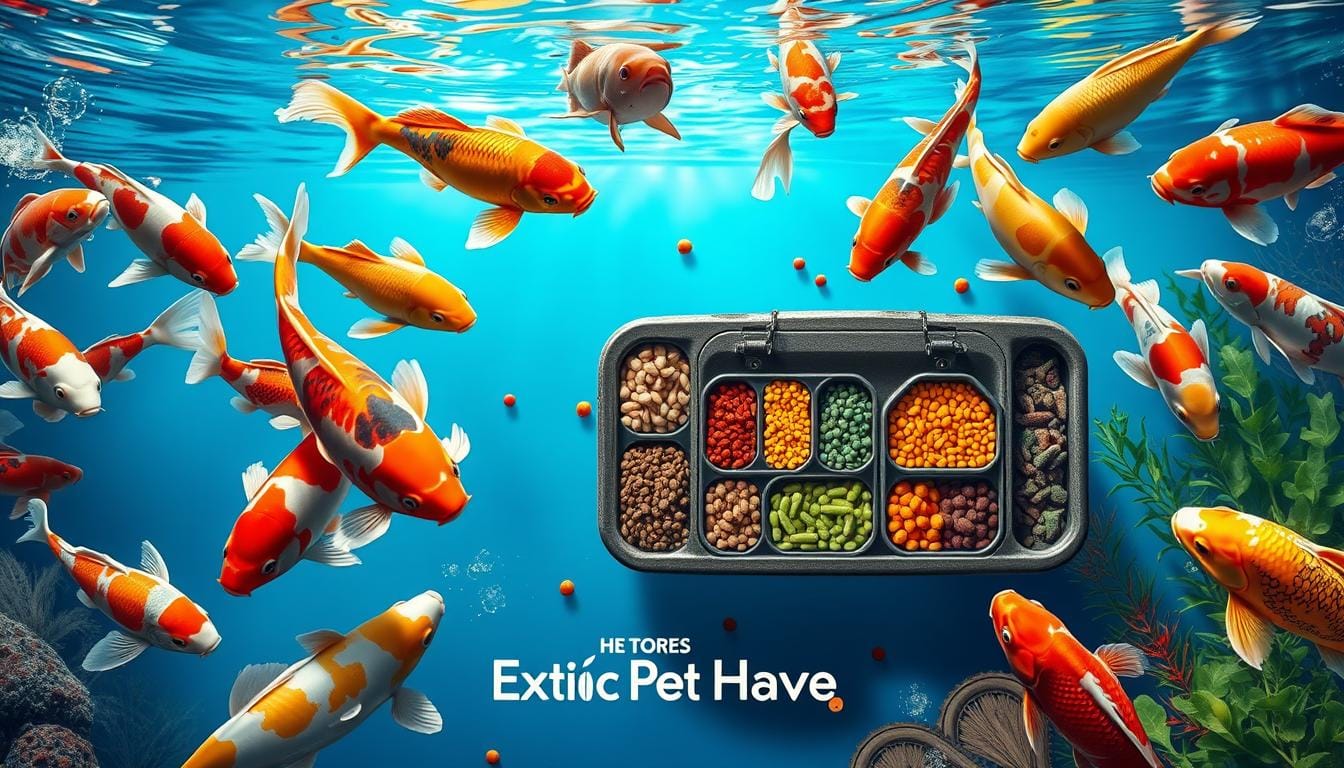The first time I saw koi fish in my backyard pond, I was amazed. Their colors and movements were so captivating. I soon learned that knowing what they eat was key to their health.
Koi fish are interesting creatures with special dietary needs. They need a mix of foods to stay healthy and colorful. How you feed them can greatly affect their life and health.
For koi fish, having a variety of food is important. They do best when they eat foods that match their natural diet. This includes proteins, vegetables, and special supplements to keep them in top shape.
Table of Contents
Understanding Koi Fish Dietary Needs
Keeping your koi fish healthy is key to their long life. What they eat affects their growth, color, and health. Knowing what to feed them is essential for their well-being.
Importance of Balanced Nutrition
Feeding koi fish is more than just throwing food in the pond. A balanced diet keeps them healthy and colorful. It supports their growth, immune system, and overall health.
- Optimal growth and development
- Enhanced immune system
- Vibrant color preservation
- Improved overall health
“Nutrition is the foundation of your koi’s health and longevity.” – Koi Keeping Expert
Nutritional Requirements by Age
Koi fish at different stages need different foods. Young ones need more protein for fast growth. Older koi need a balanced diet. Here’s what they need:
| Koi Life Stage | Protein Requirement | Fat Requirement |
|---|---|---|
| Growing Koi | 32-38% | 5-8% |
| Mature Koi | 28-32% | 3-5% |
Choosing the right food is crucial for your koi’s health. Protein, carbs, and vitamins are all important.
Top 5 Foods for Koi Fish
Finding the right food for koi fish is key to their health and color. Knowing what they eat helps you give them a balanced diet. This diet supports their growth and happiness.
Koi fish need a variety of foods to stay healthy. Here are the top foods to keep your koi happy and healthy:
High-Quality Pellets: The Nutrition Powerhouse
Pellets are the main food for koi fish. Choose premium pellets with:
- 32-38% protein for growing koi
- 28-32% protein for mature koi
- 3-10% fat content
- Pellet sizes ranging from 3-5mm
Fresh Vegetables: Natural Nutrition Boosters
Koi love fresh veggies as a diet supplement. Great veggie options include:
- Lettuce
- Spinach
- Zucchini
These veggies add important nutrients and variety to their meals.
Freeze-Dried Foods: Protein-Rich Treats
Add freeze-dried foods to your koi’s diet for extra protein:
- Bloodworms
- Brine shrimp
- Krill
These foods are packed with nutrients and make mealtime exciting.
Live Foods: Natural Hunting Experience
Give live foods to make your koi feel like they’re hunting:
- Earthworms
- Crickets
- Mealworms
Live foods are full of protein and encourage natural behaviors.
“Variety is key to a healthy koi diet. Rotate between different food types to ensure complete nutrition.” – Koi Nutrition Expert
The best diet for koi fish mixes quality pellets with various supplements. Always feed them in 5 minutes to avoid overfeeding and keep the water clean.
How Often Should You Feed Koi Fish?
Knowing when to feed your koi fish is key to their health. Their diet changes with the seasons and water temperature. It’s important to watch their eating habits closely to keep them well-fed and growing.
Temperature is a big factor in how often to feed koi fish. Different temperatures affect their eating habits:
- 50-55°F: Feed once weekly
- 55-61°F: Feed once daily
- 62-65°F: Feed twice daily
- 66-73°F: Feed three times daily
- 74-77°F: Feed four times daily
- 77°F and above: Feed five or more times daily
Seasonal Feeding Guidelines
Koi fish eat less when it’s cold. Stop feeding them when the water is below 50°F. When the water warms up in early spring, start giving them wheat germ-based foods again.
“Proper feeding is not just about quantity, but about understanding your koi’s seasonal requirements.”
Feeding Best Practices
To keep your fish and water healthy, follow these tips:
- Feed small portions
- Limit feeding to 5-10 minutes
- Remove uneaten food promptly
- Use high-quality, protein-rich foods
By watching the water temperature and adjusting how you feed your koi, you’ll keep them healthy and happy all year.
Common Feeding Mistakes to Avoid
Keeping your koi fish healthy means paying close attention and knowing what to do. Many pond owners make mistakes that harm their koi’s health and the pond’s water.
The Dangers of Overfeeding
Feeding too much is a big risk for your koi. Here are important tips to follow:
- Feed only what koi can eat in 3-5 minutes
- Take out any food they don’t eat right after
- Look for signs of too much waste in the pond
“Moderation is key in maintaining a healthy koi fish diet.” – Koi Nutrition Experts
Water Quality Matters
Not taking care of water quality can hurt your koi. Too much food can lead to:
- More algae
- Less oxygen
- Stress and sickness in fish
Testing and keeping the water clean are essential for happy koi. What and how much you feed affects the water, so be careful.
Experts say to feed little, clean up leftovers, and watch your pond closely.
Benefits of Varied Diet for Koi Fish
It’s important to give koi fish a varied and nutritious diet. This can greatly affect their health, color, and growth. A good diet is key to their well-being.
Feeding koi fish is more than just giving them food. A balanced diet can bring many benefits to your fish. It makes them healthier and more vibrant.
Enhancing Color and Growth
Koi fish need a diet rich in nutrients to look their best. Supplements like spirulina help make their colors more vibrant. Here are some benefits:
- Intensifies natural color patterns
- Promotes faster, healthier growth
- Supports development of distinctive markings
“A balanced diet is the secret to stunning, healthy koi fish.”
Strengthening Immune System
Good nutrition is vital for a strong immune system in koi fish. A varied diet helps them fight off diseases better.
- Provides essential nutrients for immune health
- Reduces susceptibility to environmental stressors
- Supports long-term vitality
For the best nutrition, mix high-quality pellets, fresh veggies, and protein-rich treats. This ensures your koi get all the nutrients they need. They will stay healthy and vibrant.
Special Considerations for Koi Fish Diet
It’s important to know what koi fish eat to keep them healthy. Their diet changes with the seasons and their environment. Learning about their eating habits is key.

Koi fish need a diet that changes with the weather. Their food isn’t the same all year. It’s a special plan for their health.
Seasonal Dietary Changes
Temperature affects how koi fish eat. Here’s how their diet changes with the seasons:
- Spring (50-60°F): Eat foods like wheat germ that are easy to digest
- Summer (60-75°F): Eat more protein to grow
- Fall (50-60°F): Go back to wheat germ-based foods
- Winter (below 50°F): Don’t eat much or at all
Treats vs. Staple Foods
It’s important to know the difference between staple foods and treats for koi. They should eat high-quality pellets most of the time. Treats are for fun and extra nutrition.
| Food Type | Nutritional Value | Feeding Frequency |
|---|---|---|
| High-Quality Pellets | Primary Nutrition | Daily |
| Fresh Vegetables | Supplemental Nutrients | 1-2 times per week |
| Live Foods | Protein Boost | Occasional Treat |
“A varied diet is the key to maintaining healthy, vibrant koi fish.” – Koi Nutrition Expert
Treats should not be the main part of a koi’s diet. They should be given in moderation. This helps keep them healthy and long-lived.
How to Introduce New Foods to Koi
Expanding your koi fish diet needs careful thought. Introducing new foods to koi fish is a delicate process. It requires patience and keen observation.
Successful koi fish diet changes involve strategic steps. These steps help your fish adapt to new foods comfortably.
Gradual Introduction Techniques
Here are key techniques for introducing new foods to your koi:
- Start with small amounts mixed into their regular diet
- Slowly increase the new food over 1-2 weeks
- Watch how much they eat and if they like it
- Keep a regular feeding schedule
Observing Koi Reactions
Your koi’s reaction to new foods is very important. It tells you about their food likes and health. Look for these signs:
| Reaction | Interpretation | Recommended Action |
|---|---|---|
| Enthusiastic Eating | They like the new food | Keep adding it slowly |
| Hesitation | They might not know it | Use less of the new food |
| Digestive Discomfort | It might not be good for them | Stop it and ask a specialist |
“Patience is key when expanding your koi’s culinary horizons.” – Koi Nutrition Expert
Pro tip: Remember, koi are omnivores with different needs. Their likes can change with the season, water temperature, and their own traits.
By following these steps, you’ll make sure your koi’s diet changes smoothly. This keeps them healthy and well-nourished.
Understanding Koi Fish Behavior While Eating
Watching your koi fish eat can tell you a lot about their health. Their eating habits are interesting and show what they need to stay healthy. This is a chance for pond owners to learn about their pets’ needs.

Signs of Healthy Eating Habits
Healthy koi fish show certain behaviors when they eat. Look for these signs:
- Eagerly approaching food at feeding time
- Consuming food within 3-5 minutes
- Swimming actively and alertly
- Showing consistent appetite
What to Do If Your Koi Won’t Eat
If your koi fish don’t want to eat, there could be several reasons. Water quality is often the main issue. Here are steps to take:
- Check water temperature and parameters
- Inspect for potential disease symptoms
- Evaluate stress factors in the environment
- Experiment with different food types
“A koi’s appetite is a window to its overall health and environmental conditions.”
Koi fish eating habits can be affected by many things. If they keep not eating, it’s important to get help from a koi expert. They can help figure out what’s wrong and how to fix it.
| Feeding Behavior | Potential Cause | Recommended Action |
|---|---|---|
| No interest in food | Poor water quality | Test and adjust water parameters |
| Sporadic eating | Temperature fluctuations | Stabilize pond temperature |
| Reduced appetite | Potential illness | Veterinary consultation |
Getting to know your koi’s eating habits takes time and patience. It also means keeping their pond environment the best it can be.
Frequently Asked Questions About Koi Diet
Koi fish owners often wonder what to feed their pets. Knowing what do koi fish eat is key to their health and happiness. Let’s explore some common questions about koi diet.
Can Koi Eat Feeder Fish?
Koi can eat smaller fish, but feeding live feeder fish is not recommended. This can bring harmful diseases to your pond. Experts advise on a balanced diet that meets all nutritional needs without the risks of live prey.
Are There Toxic Foods for Koi?
There are foods that can harm your koi. Here are some to avoid:
- Avocado
- Chocolate
- Caffeine
- Processed human foods
Pro tip: Use commercial koi foods and fresh veggies as treats. This ensures a safe and nutritious diet.
“A healthy koi is a happy koi” – Pond Keeping Wisdom
Remember, your koi’s diet is crucial for their health, color, and life span. Avoiding toxic foods and providing a balanced diet will help your koi thrive.
Conclusion: Creating the Perfect Diet for Your Koi
Creating the best diet for koi fish is a thoughtful process. Their diet is key to their health, color, and life span. By understanding their needs, you can keep them vibrant and strong for years.
A good diet for koi includes high-quality pellets, fresh veggies, and treats now and then. Watch how they react to different foods and adjust their diet with the seasons. This keeps them healthy.
Don’t forget, keeping the pond clean is just as important as their diet. Water quality, temperature, and pH levels affect how well they digest food. Regular health checks and watching them closely will help you make the right diet changes.
Key Dietary Strategies
To get the most out of your koi, mix up their diet and keep an eye on their growth. Be ready to adjust their diet as their needs change. With the right approach, you can help them stay healthy and look amazing.

